ATEA Region 5 meets in North Platte, Nebraska
North Platte, NE often serves as a stopping place on the transit between the East and the West Coasts of America. The Original Transcontinental Airways that carried mail between Washington D.C., New York & San Francisco made a stopover at the North Platte Landing Field, which was the first lighted airfield in the United States. Union Pacific Rail Road operates Bailey Field, the world’s largest classification yard, where railroad cars are sorted and sent out along the tracks in 23 states.

Display at the North Platte Landing Field
It would be easy to drive right on through North Platte on Interstate 80 on your way across country. But if you do stop in North Platte, you will find a thriving community. Two Community Colleges serve many populations in North Platte, from teenagers working to finish their secondary education while getting college credit, to work force development in technology or health care, to continuing education classes in art, music or entrepreneurship. A large Union Pacific diesel engine graces the North Platte Community College North campus, and serves to train engineers and mechanics. That campus houses many applied technical programs such as building construction, HVAC, electrical, and automotive. Roger Fattig, who teaches building construction, ordered a ShopBot PRT alpha 4’ x 8’ a little over a year ago to introduce digital fabrication into the woodworking and building construction program. An article on their website describes how the ShopBot quickly and precisely cut the arches over the windows on the house that the building construction, HVAC, and electrical students built to auction off this year.
In October, North Platte Community College, a division of Mid-Plains Community College, hosted the Region 5 meeting of the American Technology Education Association (ATEA). The mission of the ATEA is to serve as the leading provider of professional development for postsecondary technical educators. Roger Fattig invited ShopBot to attend, and so I made the trip to America’s Heartland. It involved a flight to Denver, then a smaller prop plane to North Platte over golden landscape punctuated with green polka dots indicating irrigated crops.
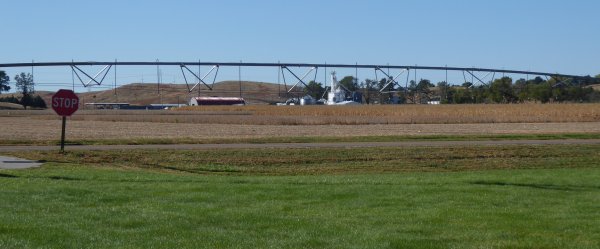
Center-pivot irrigation, or water wheels, allow farmers to grow crops.
North Platte is a friendly place. I chose to eat dinner at the airport diner, and was perusing the photos of Amelia Earhart and Charles Lindbergh when an older gentleman came up to tell me about Amelia lifting his sister into the cockpit of her plane. When I described why I was visiting, he talked about the little machine that they took around to high schools and fairs to show people the capabilities they had at the college. My first assumption was that he was describing a 3D printer…but then I really listened to what he was saying. Could it be a Handibot?!? (It was.)
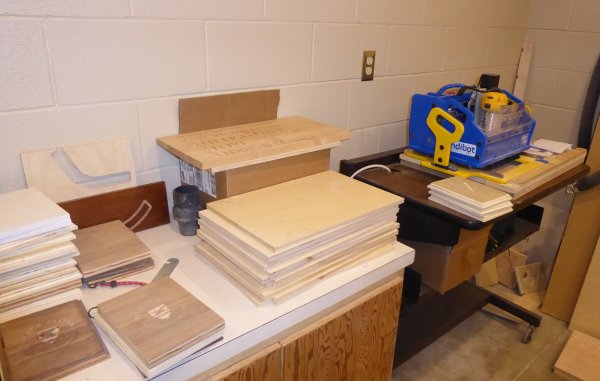
Handibot on its jig, with blanks ready to head out for a demonstration about computer-controlled woodworking.
Early on my first full day, I met Roger and several other instructors at the North Campus, and got a tour of the house that had been built by students and staff to be auctioned off as a fund raiser. NPCC started with a Handibot, then a local business suggested that they order a full sized tool so that they could train students to run the actual machines that are used in businesses in the community. In the wood shop, I spoke with an instructor who wasn’t keen on everything needing power and computers, so taught woodworking using conventional tools. His rocking chair is a piece of art. But he saw the value of the ShopBot when he realized that one of his students could use it, rather than a hand sander and jigs, to plane her thick slabs of wood quickly and evenly. Instructors from across the campus came to the classroom for an informal training, and we imported artwork from a book included with the new TorchMate plasma cutter to create files for the ShopBot, and vice versa. Faculty teaching theatre and other arts, as well as STEM education were invited to participate.
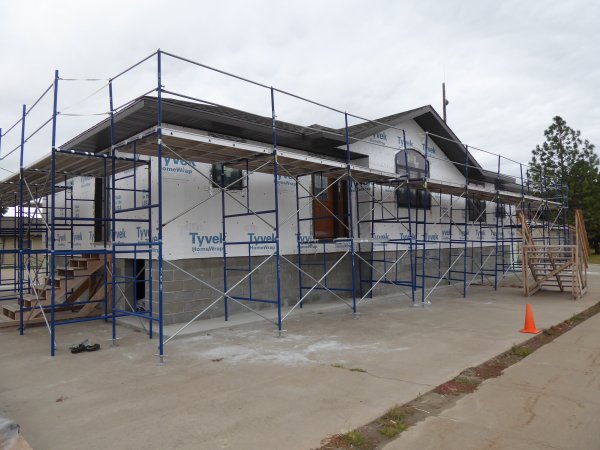
House built by NPCC faculty and students in building construction, HVAC, electrical and plumbing. This house has been auctioned off and a new one started. The ShopBot fabricated the arch over the Pella window.
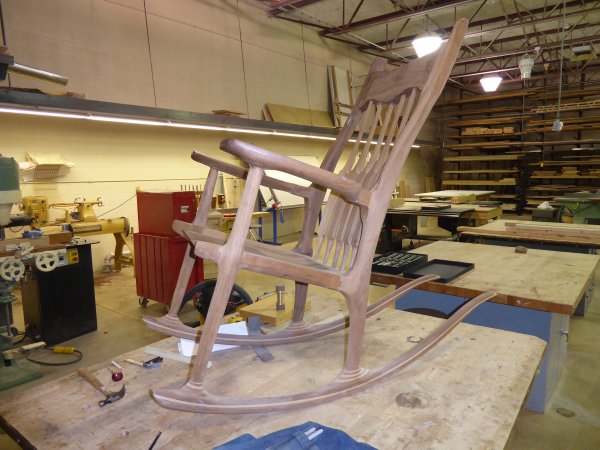
Rocking chair made with traditional tools.
This year’s Region 5 of ATEA was a smaller than expected (see below), with 50 – 60 people attending. As part of the conference, tours were arranged at local businesses. I grabbed a seat on the bus to Grain Bin Antique Town, where grain bins from the 1930s have been set up as storage units for carefully arranged antiques. The part-time endeavor has turned into a destination in the sand hills of Nebraska. Another businesswoman who runs Feather River Vineyards set up a wine tasting among the ladders, furniture and street signs in the main building. A former biology teacher herself, she noted the lack of younger people with the skills to continue the wine industry. Ryan Purdy, President of NPCC, perked up his ears and asked for more information on how the community college could fill that need. Roger Fattig raised the possibility of his woodworking program/ShopBot as a way to create customized gifts such as cutting boards for the Vineyard’s gift shop and wedding parties.
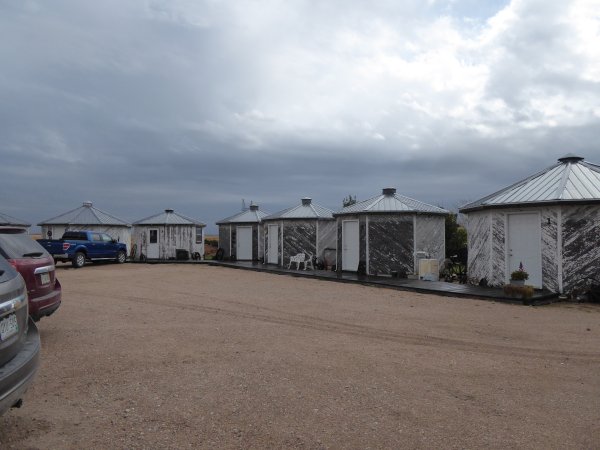
Grain bins from the ’30s recycled into storage units for consignment antique businesses.
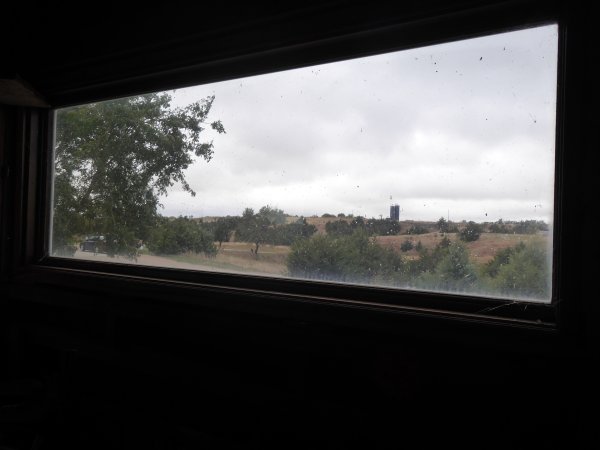
View across the Sand Hills from inside one of the bins.
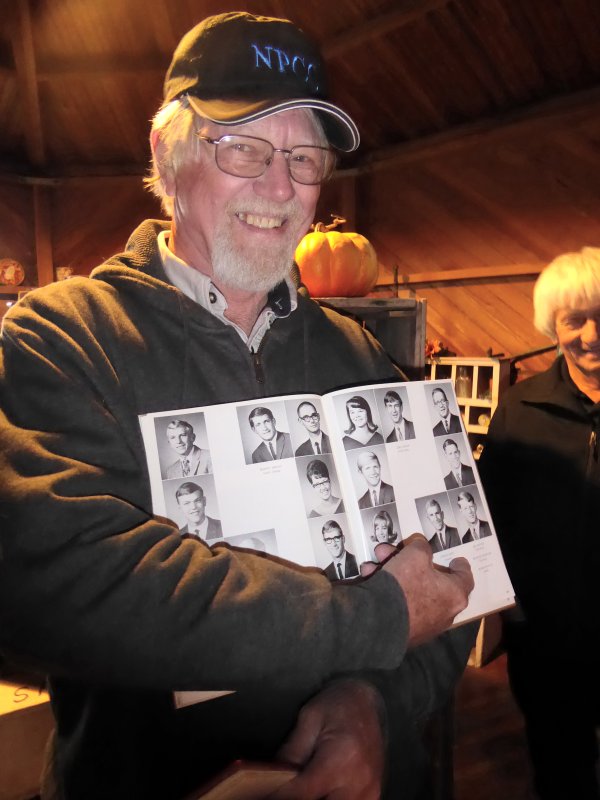
Roger Fattig finds an old yearbook with his picture from when he attended college in North Platte.
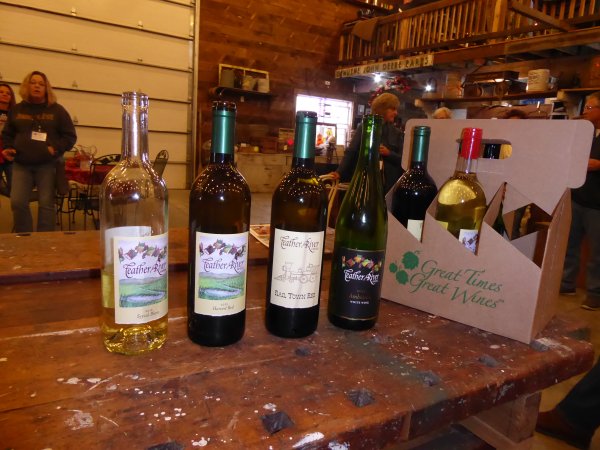
A selection of wines from Feather River Vineyards.
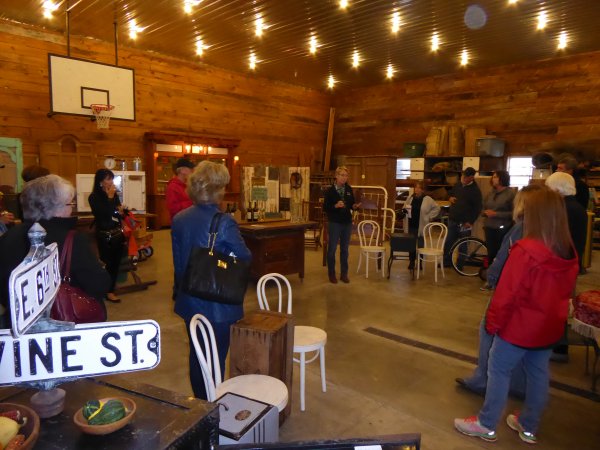
Wine tasting among the antiques.
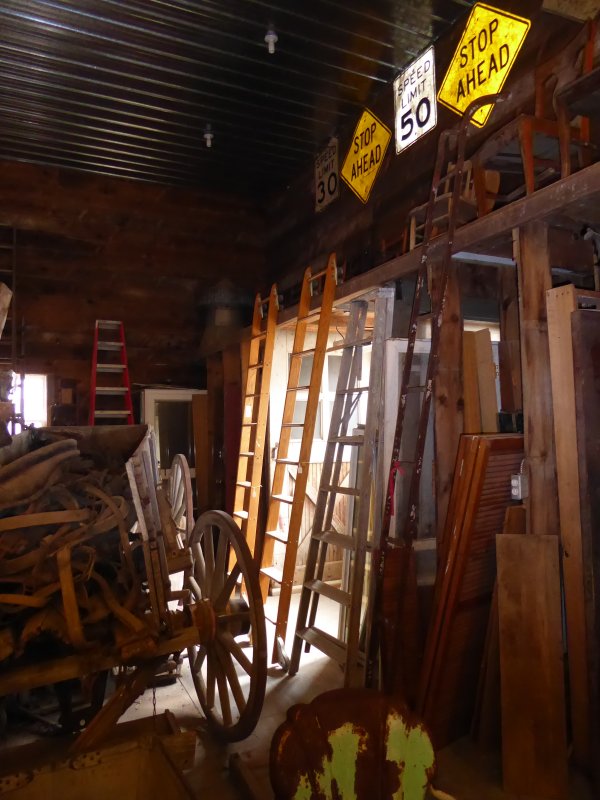
Ladders, signs, wagons and leather.
Many people associated with the Community College have formed lasting relationships in the town. Roger and his wife, Melanie, moved to Oklahoma for a time, but moved back “temporarily” to help his father twenty years ago. They, two of their three children, and their grandchildren, love living in North Platte. The woman who runs the vineyard is married to the physician who is the family doctor for the Fattig family. While grabbing a quick lunch at a local fast food place, Roger caught up with a former student (the one who first mastered the ShopBot) as he went through the drive-through line. The head of the local museum (Buffalo Bill Cody settled in North Platte, World War II troops traveling by rail passed through the canteen) is really excited to hear that the ShopBot can carve topographic maps for displays for the museum, or create reproductions. Ryan Purdy, President of NPCC, has lived here all of his life, and can’t imagine living any place else. He is welcoming to newer industries in town, such as the breweries that are crafting beer. He was interested to learn that a makerspace in Portland, OR, ADX, has a fabrication group that takes on custom jobs, such as using their ShopBot to fabricate the pulls for the taps of many of the breweries in the city.
On the trip back to the college I asked President Purdy a few questions about the business of running a Community College. In the five years that he has been President, he has overseen a $3Million investment in the resources of the college, including updating the equipment and technology such as the ShopBot in the woodworking/building construction program and a TorchMate plasma cutter in the welding program. Funding for the college comes from three main sources: About 45 percent from the state, 35 percent from local taxes, and the rest from tuition. When I asked how he felt about Community College being tuition-free, he shook his head and said that the students “needed some skin in the game.” If they didn’t have some personal investment, they were more likely to start something and not complete it.
Region 5 of the ATEA includes colleges from 8 states, from Montana to Minnesota, and south to Kansas. The state of the economy affects the Community Colleges and the vendors who attend the meetings. For example, the drop in price in natural gas has resulted in South Dakota having their budget cut, and there were no travel funds to attend the ATEA meeting. Thus, there were few visitors to the vendor who was displaying equipment to train people to work with natural gas. Roger’s invitation to ShopBot to give presentations in how to use CNC equipment for everything from creating circuit boards to 3D milling brought faculty, administrators and students to the building construction area. It would appear that Community Colleges that have digital fabrication tools that can serve multiple audiences can respond to changes in local and national events.